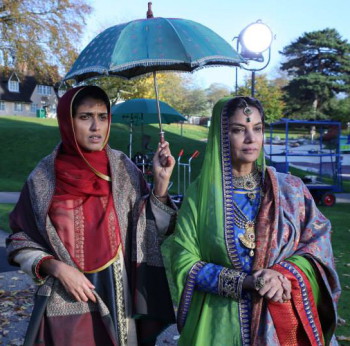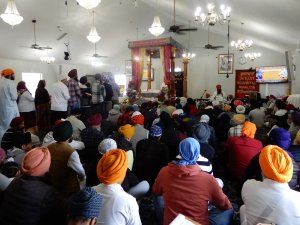 Indianapolis, Indiana USA - July 22, 2017: If history, palace intrigues, period costumes and royal settings, Sikh sacred and traditional music, an agonizing search for identity, unique cultural insights, and a lost kingdom sound interesting to you, then this movie, "The Black Prince" will leave you fascinated, deeply saddened, angry, and in some ways, sympathetic to the valiant yet unsuccessful outcome of Maharaja Duleep Singh, the last Sikh Maharaja of the Punjab, to regain his rightful Kingdom. The lifelong trials of Maharaja Duleep Singh (1838-1893), the youngest son of celebrated Sher-e- Punjab (the Lion of Punjab), Maharaja Ranjit Singh, are featured in the Hollywood Movie "The Black Prince," directed by Kavi Raz, starring famous Punjabi singer and artiste, Satinder Sartaaj as Maharaja Duleep Singh; celebrated actress and Bollywood legend Shabana Azmi as Maharani Jindan, Duleep's mother; Amanda Root as Queen Victoria; and Jason Flemyng as Dr. James Login, guardian of the young Maharaja.
Indianapolis, Indiana USA - July 22, 2017: If history, palace intrigues, period costumes and royal settings, Sikh sacred and traditional music, an agonizing search for identity, unique cultural insights, and a lost kingdom sound interesting to you, then this movie, "The Black Prince" will leave you fascinated, deeply saddened, angry, and in some ways, sympathetic to the valiant yet unsuccessful outcome of Maharaja Duleep Singh, the last Sikh Maharaja of the Punjab, to regain his rightful Kingdom. The lifelong trials of Maharaja Duleep Singh (1838-1893), the youngest son of celebrated Sher-e- Punjab (the Lion of Punjab), Maharaja Ranjit Singh, are featured in the Hollywood Movie "The Black Prince," directed by Kavi Raz, starring famous Punjabi singer and artiste, Satinder Sartaaj as Maharaja Duleep Singh; celebrated actress and Bollywood legend Shabana Azmi as Maharani Jindan, Duleep's mother; Amanda Root as Queen Victoria; and Jason Flemyng as Dr. James Login, guardian of the young Maharaja.
 The full-length feature historical-drama, the first of its kind undertaking by Hollywood about a sad and true chapter in Sikh history, was released in 13 countries worldwide starting July 21, 2017. I knew the general happenings around this story since I was a child growing up in India, but many significant details became evident when I saw the film with my family at AMC Castleton Square in Indianapolis, Indiana with a handful of Sikh Hoosiers. The film unraveled many mysteries surrounding the story and Sikh struggle, symbolizing freedom from British rule and unjust occupation of India.
The full-length feature historical-drama, the first of its kind undertaking by Hollywood about a sad and true chapter in Sikh history, was released in 13 countries worldwide starting July 21, 2017. I knew the general happenings around this story since I was a child growing up in India, but many significant details became evident when I saw the film with my family at AMC Castleton Square in Indianapolis, Indiana with a handful of Sikh Hoosiers. The film unraveled many mysteries surrounding the story and Sikh struggle, symbolizing freedom from British rule and unjust occupation of India.
Kavi Raz, the visionary behind the film project is an accomplished actor, director, producer, writer, and film maker pioneer with a focus on Indian and Sikh sensitive themes and subjects. Kavi Raz directed a beautiful film, "The Gold Bracelet" that featured a Sikh family that became victim to post 9/11 events due to mistaken identity and triumphed over divides and unfounded stereotypes through education, goodwill, and events. The "The Gold Bracelet" won many awards and accolades at several national and international film festivals and critical acclaim in several categories.
A WORD ABOUT THE GREAT MAHARAJA RANJIT SINGH
Maharaja Ranjit Singh's Kingdom stretched across the undivided Punjab that included Northwest Frontier. The Sikh Kingdom was the last to be captured and annexed by the British in 1849 after two Anglo-Sikh Wars (1845 and 1848). Maharaja Ranjit Singh (1780 -1839) was a powerful and benevolent secular ruler and respected all faiths, and they were a part of his ruling circle and philanthropy. Many Sikhs today have direct connections with the life and times of Maharaja Ranjit Singh and Maharaja Duleep Singh. Two of our ancestors, Mehar Singh and Mohar Singh, served as generals in the army of Maharaja Ranjit Singh.
Maharaja Ranjit Singh, among his many benevolent projects, renovated the ravaged Harmander Sahib, the Holiest shrine of the Sikh faith at Amritsar, embellished the interior and outside facades with intricately designed gilded copper plates and paved the shrine with marble slabs inlaid with precious stones. That gave the majestic shrine its popular name: The Golden Temple, annually visited by millions of people of diverse faiths and cultures from around the world.
 REFLECTING ON FUTURE SIKH RESEARCH PROJECTS
REFLECTING ON FUTURE SIKH RESEARCH PROJECTS
The film, "The Black Prince," provides insights into Sikh faith, culture, history, struggles, and great sacrifices. In an original letter from Maharaja Duleep Singh (attached, shared by a friend), Maharaja Duleep Singh graciously asks Queen Victoria for the Koh-i-Noor (the mountain of light) Diamond to be rightfully returned to him. The letter reveals his valiant efforts to regain the Kingdom of Punjab, his deep anguish and disappointment at the British actions to deny his legitimate claim. The Movie "The Black Prince" is likely to inspire additional research and debate into that period of history of the Sikh Royal Family, the raging strife, and treachery within the inner royal circle; and the unjust conduct, misrepresentations, and deception of the British officials to spirit the young King away from his homeland, his Sikh faith, and his rightful Kingdom.
For additional information about "The Black Prince:" http://www.imdb.com/title/tt3962984/





